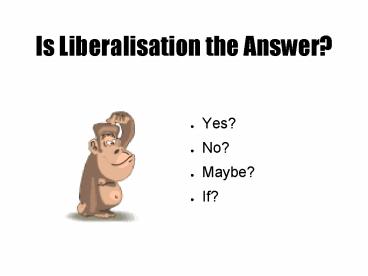Is Liberalisation the Answer - PowerPoint PPT Presentation
1 / 9
Title:
Is Liberalisation the Answer
Description:
'The process of systematically reducing and eventually eliminating all tariff and ... of permitted to become a hole through which vital capital leaks to other nations ... – PowerPoint PPT presentation
Number of Views:36
Avg rating:3.0/5.0
Title: Is Liberalisation the Answer
1
Is Liberalisation the Answer?
- Yes?
- No?
- Maybe?
- If?
2
Liberalisation Defined
- Trade liberalisation
- The process of systematically reducing and
eventually eliminating all tariff and non-tariff
barriers between countries as trading partners. - Telecommunications liberalisation
- The process of systematically reducing and
eventually eliminating all tariff and non-tariff
barriers across the communications sector
Getting Government out of business ?
3
Yes, liberalisation is the answer
A Phased Approach to Liberalisation
4
Yes, liberalisation is the answer
- Technology is developing exponentially (Moore's
Law) - Africans' needs and demands for greater, better,
faster services have increased - Legacy, monopoly systems are not scalable to meet
demands - Need for modern, scalable, future-proof
infrastructure/services - Liberalised market has the potential to move fast
enough to meet demand
5
No, Liberalisation is not the answer
- If not handled right, liberalisation can lead to
bigger, badder problems
6
No, liberalisation is not the answer
Share of backbone connections to countries with
less than 5 ISPs Source OECD via Netcraft
7
Maybe liberalisation is the answer
- When the process is undertaken as a result of
consultation between government, consumers, and
the private sector - When national resources are protected, instead of
permitted to become a hole through which vital
capital leaks to other nations - When emphasis is placed on the development of
in-country capacity e.g. Technology transfer
components on International tenders
8
Liberalisation is the answer if
- Continuous review of goals/objectives with
adjustments according to changes in the
marketplace - Neighboring countries harmonise policy on a
regional/continental basis - Weight and incidence of regulation is adjusted
according to the stage of liberalisation
9
Thank You
- Brian Longwe
- Sp. Manager, AFRISPA
- brian_at_pch.net































